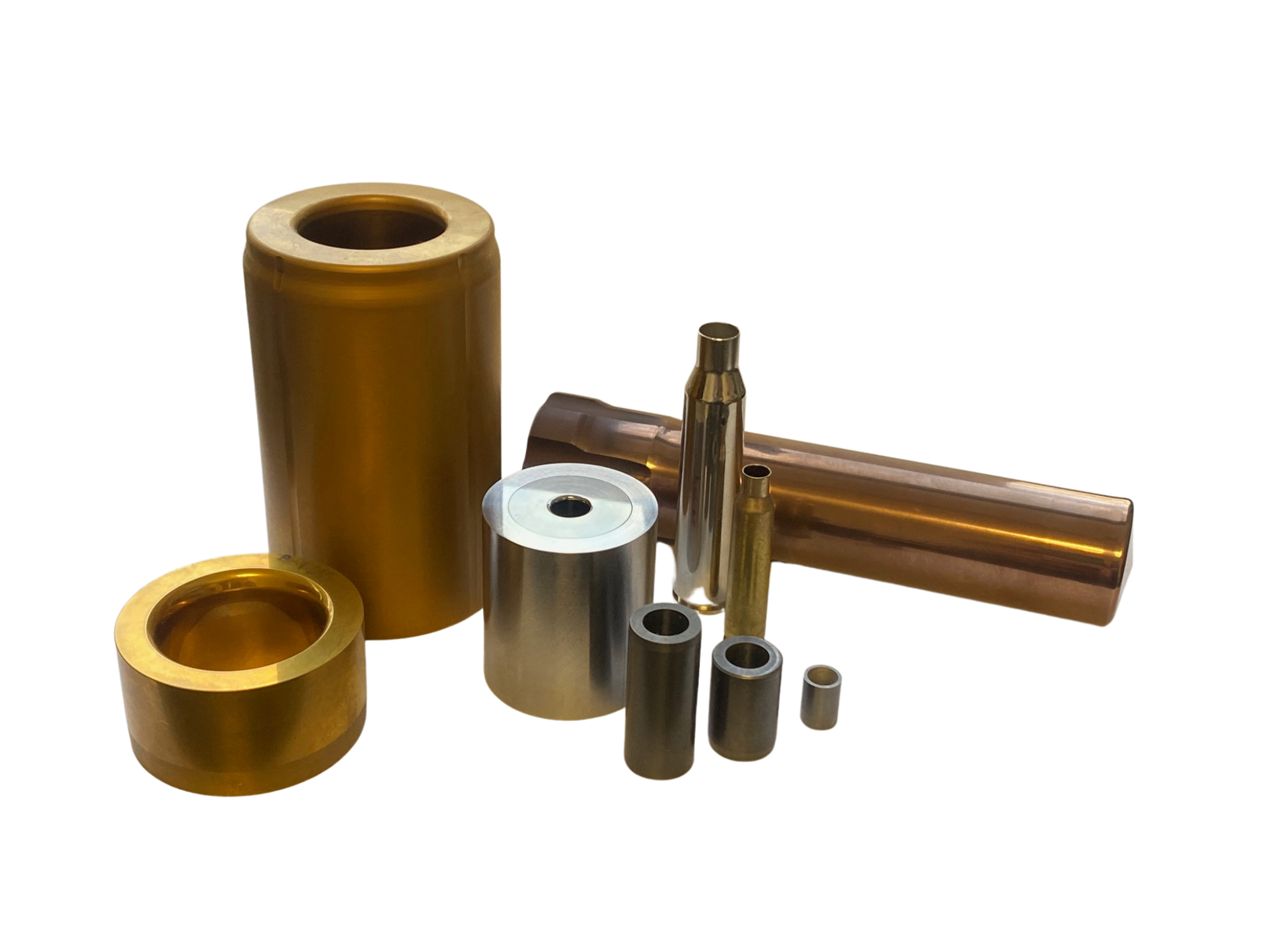What is Tungsten Carbide?
So you hear about Carbide Dies and Tooling made out of tungsten carbide, but what exactly is tungsten carbide?
Tungsten carbide
Tungsten carbide (chemical formula: WC) is a chemical compound containing equal parts
of tungsten and carbon atoms. Tungsten carbide starts as a fine gray powder, in its most
basic form. It can be pressed and formed into shapes for use in industrial machinery, cutting
tools, abrasives, armor-piercing rounds, other tools and instruments, and jewelry.
Tungsten carbide is approximately two times harder than steel and has a much higher
density than steel or titanium. Its hardness is comparable with corundum, sapphire and ruby
and can only be polished and finished with abrasives of superior hardness such as cubic
boron nitride and diamond, in the form of powder, wheels, and compounds.
Applications:
Cutting tools for machining
Sintered tungsten carbide cutting tools are much more resistant to abrasion, as well
as, can handle higher temperatures better than high speed steel tools. Carbide
cutting tools are often used for machining through materials such as carbon
steel or stainless steel, as well as in situations where other materials would wear
away, such as in high-quantity production runs. Carbide tools’ sharp cutting edge
lasts longer than other tools, produce a better finish on parts, and their temperature
resistance allows faster machining.
Ammunition
Tungsten carbide is often used in armor-piercing ammunition. WC projectiles were
first used by German Luftwaffe tank-hunter squadrons in World War II. It is an
effective penetrator due to its combination of great hardness and very high density.
Tungsten carbide ammunition can be one of two types: the sabot type (a large arrow
surrounded by a discarding push cylinder) or a subcaliber ammunition. Subcaliber
ammunition is where copper or other relatively soft material is used to encase the
hard penetrating core, the two parts being separated only on impact. Subcaliber
ammunition is more common in small-caliber arms, while sabots are usually
reserved for tank guns.
Nuclear
Tungsten carbide is also an effective neutron reflector and as such was used during
early investigations into nuclear chain reactions, particularly for weapons.
Sports
Tungsten carbide is used by athletes for poles that strike hard surfaces. Trekking
poles, used by hikers for balance and to reduce pressure on leg joints, commonly
use carbide tips to gain traction when placed on hard surfaces, such as rock.
Carbide tips last much longer than other types of tip.
Sharpened carbide tipped spikes can be inserted into the drive tracks
of snowmobiles. These spikes greatly improve traction on icy surfaces. Longer v-
shaped segments fit into grooved rods called wear rods under each snowmobile ski.
The sharp carbide edges help to enhance steering on harder icy surfaces. The
carbide tips and segments reduce wear from crossing roads and other abrasive
surfaces.
Some tire companies offer bicycle tires with tungsten carbide studs for better traction
on ice. These are often preferred to steel studs because of their superior resistance
to wear.
Surgical instruments
Tungsten carbide is also used for making surgical instruments for use in open
surgery (scissors, forceps, hemostats, blade-handles, etc.) and laparoscopic
surgery (graspers, scissors/cutter, needle holder, cautery, etc.). They are much
more costly than their stainless-steel counterparts, but perform better.
Jewelry
Tungsten carbide has become a popular option for bridal jewelry due to its extreme
hardness and high resistance to scratching. The extreme hardness also means that
it can occasionally be shattered under certain circumstances. Tungsten carbide is
roughly 10 times harder than 18k gold.
Other
Tungsten carbide is widely used to make the rotating ball in the tips of ballpoint
pens that disperse ink during writing.
Tungsten carbide is a common material used in the manufacture of gauge blocks,
used as a system for producing precision lengths in dimensional meteorology.
So that's it... now you know the rest of the story... and knowing is half the battle.
Subscribe to:
Comments (Atom)
Hot Forging and the Role of Carbide Inserts in High-Temperature Manufacturing
Hot forging shapes heated metal—often at temperatures between 1,500°F and 2,200°F—into durable, complex components. The extreme heat softens...

-
One should not confuse a tinkerer and a tinker! A tinkerer is a person who tinkers with machinery, modifies products and is the heart an...
-
Machinists are famous for making everything we use or the parts that make the things we use... but only slightly less know for their quotes ...
-
Welcome to the latest and greatest instalment of shop humor from the carbide dies blog. Humor has long stopped murders on the shop floors a...





